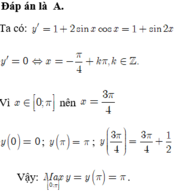

Hãy nhập câu hỏi của bạn vào đây, nếu là tài khoản VIP, bạn sẽ được ưu tiên trả lời.



a/ \(y'=2cos2x=0\Rightarrow cos2x=0\Rightarrow x=\frac{\pi}{4}+\frac{k\pi}{2}\)
Do \(x\in\left[0;\frac{\pi}{2}\right]\Rightarrow x=\frac{\pi}{4}\)
\(cos2x< 0\) khi \(\frac{\pi}{4}< x< \frac{\pi}{2}\); \(cos2x>0\) khi \(0< x< \frac{\pi}{4}\)
Hàm số đồng biến trên \(\left(0;\frac{\pi}{4}\right)\) nghịch biến trên \(\left(\frac{\pi}{4};\frac{\pi}{2}\right)\)
b/ \(y'=-2sin2x=0\Rightarrow sin2x=0\Rightarrow x=\frac{k\pi}{2}\)
Do \(x\in\left(-\frac{\pi}{4};\frac{\pi}{4}\right)\Rightarrow x=0\)
Hàm số đồng biến trên \(\left(-\frac{\pi}{4};0\right)\) nghịch biến trên \(\left(0;\frac{\pi}{4}\right)\)

phương trình tương đương:
sin2x+cos2x+\(\sqrt{2}\)sin(x+\(\frac{\pi}{4}\))+2sinx.cosx+cos2x-sin2x=0
<=> 2cos2x+2sinx.cosx+\(\sqrt{2}\)sin(x+\(\frac{\pi}{4}\))=0
<=> 2cosx(sinx+cosx)+\(\sqrt{2}\)sin(x+\(\frac{\pi}{4}\))=0
<=>(2cosx+1).\(\sqrt{2}\)sin(x+\(\frac{\pi}{4}\))=0
<=>\(\left[\begin{array}{nghiempt}sin\left(x+\frac{\pi}{4}\right)=0\\2cosx+1=0\end{array}\right.\)
<=> \(\left[\begin{array}{nghiempt}x=k\pi-\frac{\pi}{4}\\x=\pm\frac{1}{2}+k2\pi\end{array}\right.\)với k\(\in\)Z
pt có 2 nghiệm như trên

Lê Huy Hoàng:
a) ĐK: $x\in\mathbb{R}\setminus \left\{k\pi\right\}$ với $k$ nguyên
PT $\Leftrightarrow \tan ^2x-4\tan x+5=0$
$\Leftrightarrow (\tan x-2)^2+1=0$
$\Leftrightarrow (\tan x-2)^2=-1< 0$ (vô lý)
Do đó pt vô nghiệm.
c)
ĐK:.............
PT $\Leftrightarrow 1+\frac{\sin ^2x}{\cos ^2x}-1+\tan x-\sqrt{3}(\tan x+1)=0$
$\Leftrightarrow \tan ^2x+\tan x-\sqrt{3}(\tan x+1)=0$
$\Leftrightarrow \tan ^2x+(1-\sqrt{3})\tan x-\sqrt{3}=0$
$\Rightarrow \tan x=\sqrt{3}$ hoặc $\tan x=-1$
$\Rightarrow x=\pi (k-\frac{1}{4})$ hoặc $x=\pi (k+\frac{1}{3})$ với $k$ nguyên
d)
ĐK:.......
PT $\Leftrightarrow \tan x-\frac{2}{\tan x}+1=0$
$\Leftrightarrow \tan ^2x+\tan x-2=0$
$\Leftrightarrow (\tan x-1)(\tan x+2)=0$
$\Rightarrow \tan x=1$ hoặc $\tan x=-2$
$\Rightarrow x=k\pi +\frac{\pi}{4}$ hoặc $x=k\pi +\tan ^{-2}(-2)$ với $k$ nguyên.

điều kiện : cosx\(\ne\)\(\frac{1}{\sqrt{2}}\)=> x\(\ne\)\(\pm\)\(\frac{\pi}{4}\)+2k\(\pi\), k\(\in\)Z
pt<=> tử số =0
<=>cos2x-sin(3x-\(\frac{\pi}{4}\)+x+\(\frac{3\pi}{4}\))-sin(3x-\(\frac{\pi}{4}\)-x-\(\frac{3\pi}{4}\))-2=0
<=> cos2x-sin(x+\(\frac{\pi}{2}\))-sin(2x-\(\pi\))-2=0
<=> cos2x-cosx+sin2x-2sin2x-2cos2x=0
<=>-cos2x-coxs+2sinx.cosx-2sin2x=0
đến đây bạn nhóm lại ra nghiệm rồi kiểm tra đk là xong